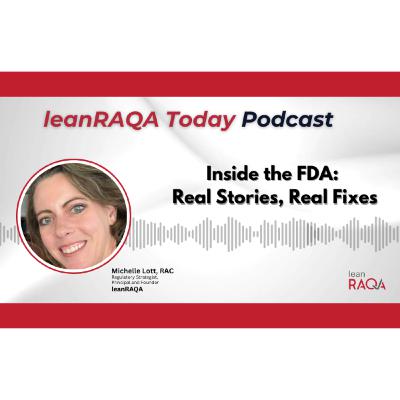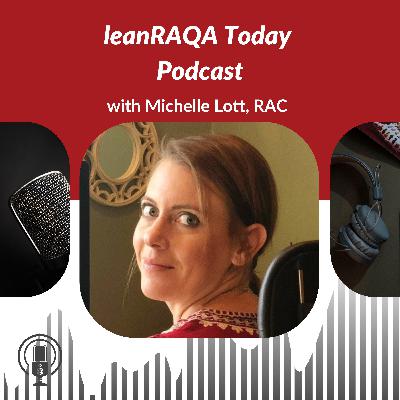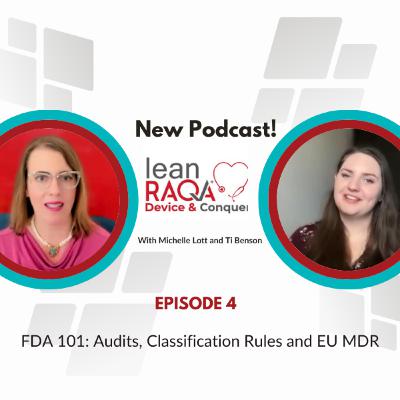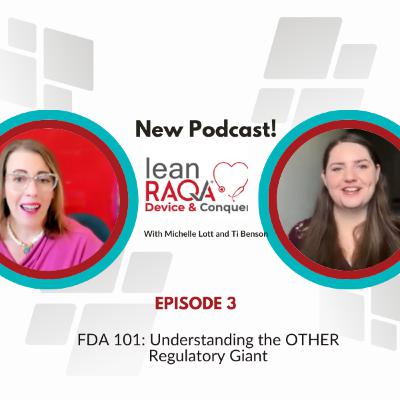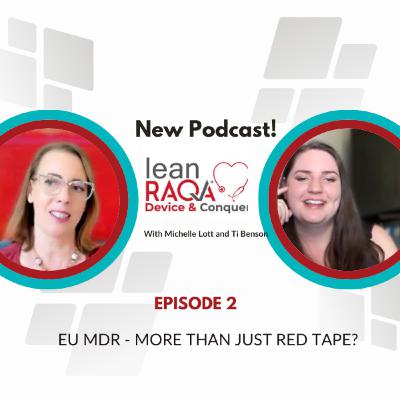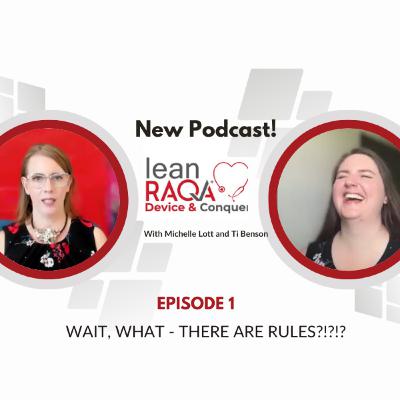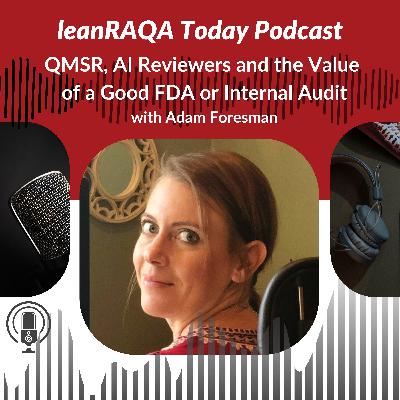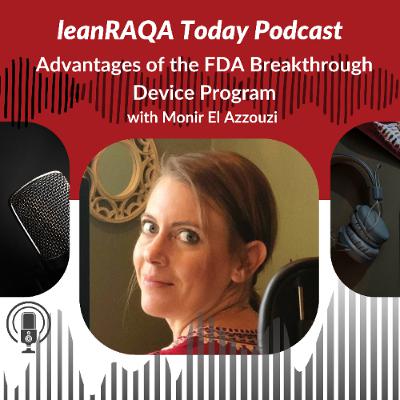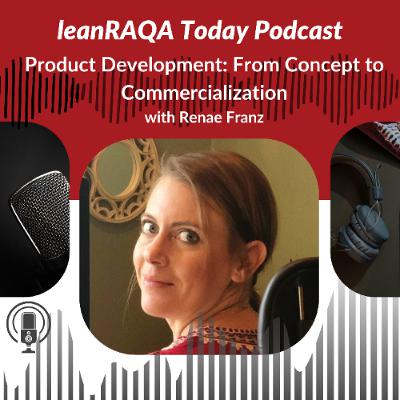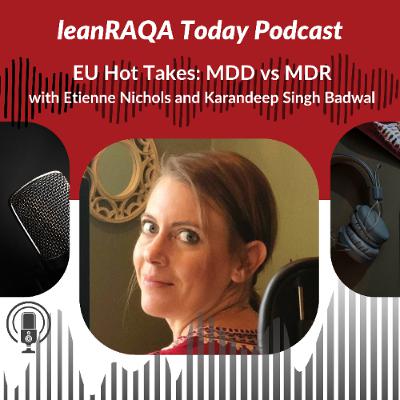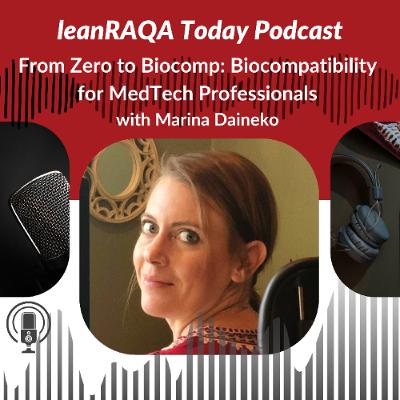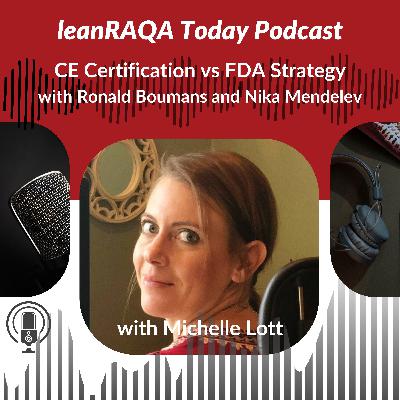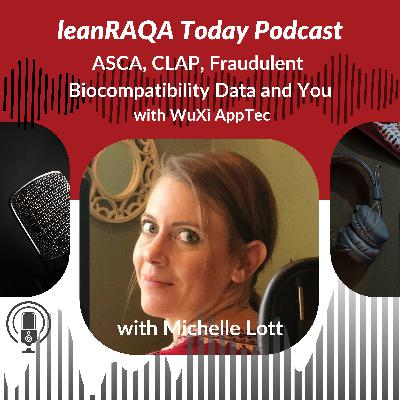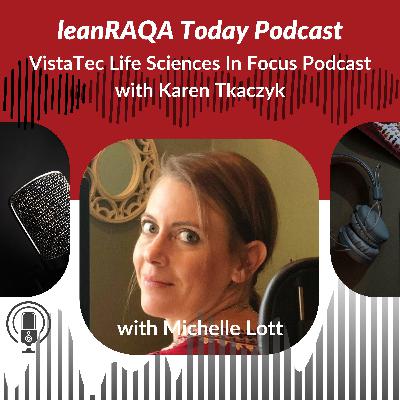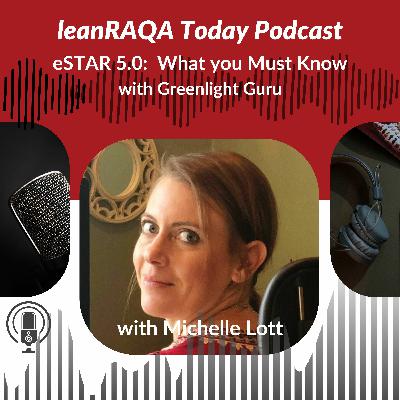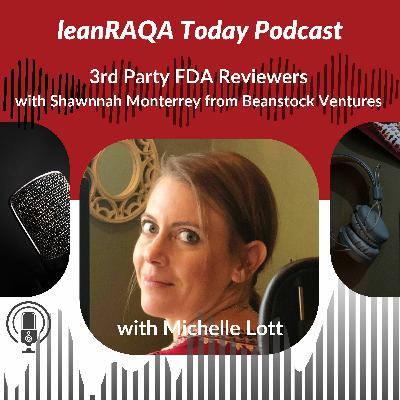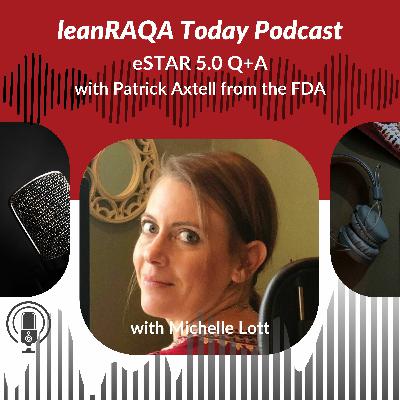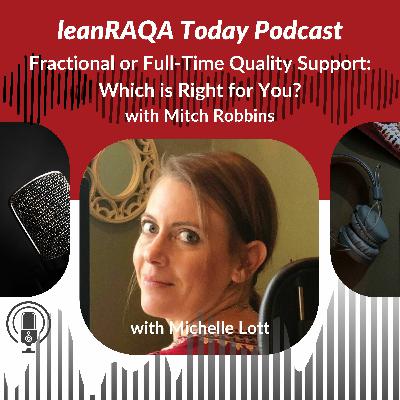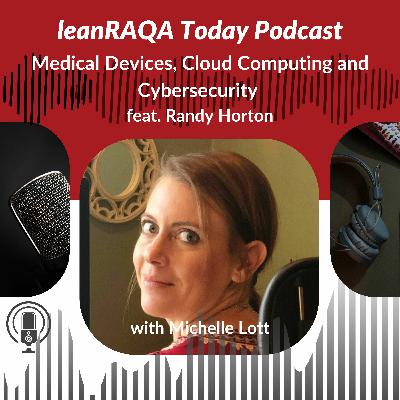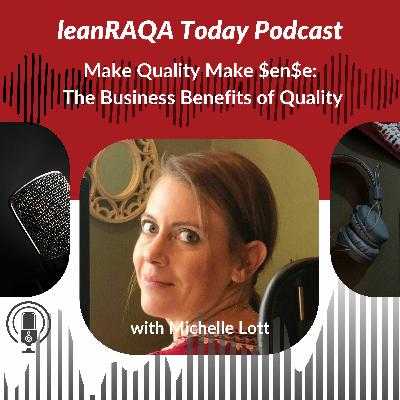Discover RAQA Today
RAQA Today

57 Episodes
Reverse
In this episode, Michelle and guests take a deep dive into what’s really happening inside the FDA in 2025. From pre-submission strategies to the blurred line between wellness and medical devices, this discussion uncovers the latest regulatory trends shaping medtech.What you’ll learn in this episode:How to structure effective FDA pre-submissions (Q-subs) for better feedbackWhy the FDA’s focus on “inherent use” claims is shaking up wellness and digital health productsReal-world examples of recalls, labeling risks, and social media misstepsWhy startups and Fortune 500s alike struggle with regulatory strategyThe rising demand for cybersecurity policies in medtech and service providersWhen (and how) to push back on FDA reviewers with evidenceIf you’re in medical device development, regulatory affairs, or quality management, this episode gives you actionable insights to avoid costly mistakes and stay ahead of FDA expectations.👉 Subscribe and never miss an update on FDA regulations, compliance trends, and medtech innovation.
In the Season 1 finale, Michelle and Ti challenge the traditional view of regulatory affairs as the “business prevention department.” Instead, they reframe regulators as strategic partners and proactive innovators who can drive compliance and competitive advantage.From shocking stories of last-minute compliance scrambles to major recalls that reshaped the industry, this episode reveals why being a “regulatory rebel” means understanding intent over letter, pushing back when it matters, and building trust across teams.Key takeaways:How proactive vs. reactive compliance impacts company culture and patient safetyWhy draft guidance matters (and how to use it to influence FDA thinking)The ethical and strategic case for regulatory professionals as innovatorsWhat Michelle and Ti would change if they ruled the FDA for a dayPerfect for regulatory pros, quality leaders, and anyone ready to challenge the status quo in medtech.Season 2 coming soon!
In this episode of Device and Conquer, we unpack the differences between the FDA’s inspection style and the EU’s notified body-driven approach. From classification rules and audit methodologies (QSR, ISO 13485, MDSAP) to unannounced FDA inspections versus Europe’s annual surveillance audits, we dig into what medical device companies really need to know before entering either market.Whether you’re a startup navigating your first clearance or a seasoned RA/QA pro, this is your crash course on how regulators (and auditors) think—and why it matters for your compliance strategy.
Who really is the FDA and how do they regulate medical devices? In this episode of Device and Conquer, we break down the U.S. Food and Drug Administration’s role—from product classification and product codes to substantial equivalence, 510(k)s, de novos, and PMAs. Learn how the FDA oversees everything from tongue depressors to pacemakers and why regulatory strategy can make or break your product’s success.
In this episode of the NEW Device and Conquer podcast, Michelle and co-host Ti dive deep into the European Union’s Medical Device Regulation (MDR) — and explain why it’s much more than just red tape.The conversation begins with a fun recap of their “Real or Ridiculous” game, where they fact-check quirky device ideas like smart spoons for Parkinson’s, mood rings that claim to detect cancer, and next-gen implants. From there, they unpack the real-world implications of MDR, explaining what the regulation means for companies, innovators, and ultimately, patients.(MDR content starts at 7:06 if you don't want to listen to "Real or Ridiculous")Key highlights include:The challenges and importance of achieving a CE mark under MDRHow MDR impacts both startups and established medtech companiesThe balance between innovation and compliance in Europe’s regulatory landscapePractical insights on how companies can prepare for MDR scrutinyThe ripple effect on global markets, investors, and patient safetyWhether you’re a regulatory affairs professional, a medical device startup, or just curious about how Europe is shaping the future of healthcare innovation, this episode breaks down complex regulations into an engaging and accessible conversation.Tune in to learn why MDR is reshaping the medtech industry — and how you can stay ahead.
What exactly is a medical device — and why does it matter if it’s regulated? In this premiere episode of Device and Conquer, hosts Michelle Lott and Ti Benson unpack the surprisingly broad world of medical devices, from smart thermometers and glucose meters to fertility tech and connected implants.You’ll hear:The difference between drugs and devicesReal-life horror stories of unregulated (and unsafe) products that changed the industryHow the FDA, EU, and other regulators define and oversee devices differentlyWhy regulations aren’t just “red tape” — they protect patients and level the playing field for innovatorsPlus: a rapid-fire game of Real or Ridiculous — can you guess which products are actual medical devices and which ones we made up?Subscribe to Device and Conquer and join us each week as we untangle the messy, fascinating, and sometimes ridiculous world of medtech regulation.
In this episode Michelle and Adam Foresman from Ryden Solutions do a deep dive into right-sizing quality systems, lean regulatory practices, and the evolving landscape of AI-driven compliance tools in medtech. They reflect on personal pain points that sparked their ventures, swap audit war stories, and share insights into regulatory shifts like QMSR, MDR, and de-harmonization trends.
Highlights:
- The hidden costs of over-documentation and duplicated audits
- How AI can proactively identify compliance gaps — even across languages
- The future of audits: less paper, more floor time, and higher impact
- Why global harmonization is unraveling, and what that means for QA/RA teams
- Real examples of FDA using AI to detect duplicated or fraudulent data
This episode is a must-listen for quality, regulatory, and compliance leaders, especially those working in startups, scaling medtech companies, and global manufacturers navigating complex, multi-jurisdictional requirements.
The FDA Breakthrough Device Program offers a expedited path to market for medical devices that offer more effective treatment or diagnosis for life-threatening or irreversibly debilitating conditions. It allows for prioritized review and enhanced communication with the FDA to help bring innovative devices to market more quickly, but it's not for everyone.
In this podcast, Michelle reviews the specifics of the program - the benefits, the requirements, the challenges - and talks about how you can decide if the program is right for you and your device.
LinkedIn: https://www.linkedin.com/in/michellelottraqa
Website: https://leanraqa.com/
YouTube: https://www.youtube.com/@leanRAQA
Instagram: https://www.instagram.com/leanraqa
Did you know that 60% of startups cannot survive beyond five years, and 75% will ultimately fail?
These failures frequently stem from late regulatory involvement, underestimation of remaining development work, and the compounding effect of early oversights.
To mitigate these risks, a structured approach is essential, emphasizing early and continuous regulatory engagement, meticulous documentation through a trace matrix to ensure cross-functional alignment, and a well-defined regulatory strategy that aligns with the chosen FDA pathway. Prototyping and manufacturing must be carefully managed, considering the impact of material and process changes, and prioritizing design for manufacturability.
Finally, a strategic commercialization plan, including appropriate sales strategies, a clear understanding of the target market, robust intellectual property protection, and adequate funding, are crucial for navigating the complex medtech landscape and achieving sustainable success.
LinkedIn: https://www.linkedin.com/in/michellelottraqa
Website: https://leanraqa.com/
YouTube: https://www.youtube.com/@leanRAQA
Instagram: https://www.instagram.com/leanraqa
Podcast of a July 2024 webinar event presented by Etienne Nichols and Greenlight Guru and featuring Karandeep Singh Badwal
The MDR is a comprehensive regulation that aims to improve patient safety and quality in the European Union, replacing the Medical Device Directive (MDD) and introducing more stringent requirements for manufacturers.
LinkedIn: https://www.linkedin.com/in/michellelottraqa
Website: https://leanraqa.com/
YouTube: https://www.youtube.com/@leanRAQA
Instagram: https://www.instagram.com/leanraqa
Everything you need to know about biocompatibility - in one podcast.
From a webinar hosted by MedTech Leading Voice and featuring Michelle and Marina Daineko from Intrinsic Medical Group.
LinkedIn: https://www.linkedin.com/in/michellelottraqa
Website: https://leanraqa.com/
YouTube: https://www.youtube.com/@leanRAQA
Instagram: https://www.instagram.com/leanraqa
Which market is best for your product - the EU or the US?
The answer is not always straightforward, but Ronald Boumans, Nika Mendelev and I did our level best to answer your questions in this Master Class presentation.
Michelle leads off with a review of FDA strategies and pathways.
15:34 - Ronald dives into the particulars of MDR and dealing with notified bodies.
27:15 - Nika Mendelev explains whether you really need to choose one or the other.
32:10 - the Q+A session begins.
Link to the full presentation on YouTube: https://youtu.be/4wyZzVibiAY
Biocompatibility testing is hot right now, in part because of the sharp increase in the number of FDA submissions containing fraudulent data. Some unethical third-party testing labs are sending their clients data mined from old 510(k) submissions - and passing it off as fresh data.
So what's a medical device manufacturer to do? That was the topic of conversation this month when I chatted with Mike McGrew and Sandi Schaible from WuXi AppTech.
LinkedIn: https://www.linkedin.com/in/michellelottraqa
Website: https://leanraqa.com/
YouTube: https://www.youtube.com/@leanRAQA
Instagram: https://www.instagram.com/leanraqa
The good folks at Vistatec invited me to participate in their Life Science In-Focus podcast last month, where host Karen Tkaczyk and I chatted about the intricacies of regulatory affairs within the life sciences.
We also discussed just how I ended up in the field, and the many challenges companies face when choosing regulatory pathways in the United States and Europe.
LinkedIn: https://www.linkedin.com/in/michellelottraqa
Website: https://leanraqa.com/
YouTube: https://www.youtube.com/@leanRAQA
Instagram: https://www.instagram.com/leanraqa
This is not last year's eSTAR - a LOT has changed, and there are things you need to know before you try to submit your 510k.
In this episode, we'll guide you through the intricacies of the latest eSTAR 5.0 platform, crucial for those of you planning a 510k or PMA submission.
We'll review the eSTAR 5.0 platform and what you need to know to use it effectively –the good, the bad, and the ugly.
The new features, including premarket approval content and updated cybersecurity documentation and dive into the simplified EMC questions, revised sterility section, and new biocompatibility testing options - we'll cover it all.
LinkedIn: https://www.linkedin.com/in/michellelottraqa
Website: https://leanraqa.com/
YouTube: https://www.youtube.com/@leanRAQA
Instagram: https://www.instagram.com/leanraqa
Why would you use a 3rd party reviewer for your submission? How does a 3rd party reviewer function? How is it different from working with the FDA?
I sat down with my good friend Shawnnah Monterrey from Beanstock Ventures to answer all your pressing questions about using 3rd party reviewers.
LinkedIn: https://www.linkedin.com/in/michellelottraqa
Website: https://leanraqa.com/
YouTube: https://www.youtube.com/@leanRAQA
Instagram: https://www.instagram.com/leanraqa
Question, questions, everyone has questions about eSTAR 5.0, so I sat down with the FDA's Patrick Axtell to answer the most pressing ones I've received.
From file size to eSTAR type to biocompatibility - we cover it all.
When is it better for a medtech startup to hire a fractional quality professional, and when is it time to hire full-time?
This is not necessarily an easy question to answer, and there can be a lot of factors impacting the decision.
In this joint podcast with Mitch Robbins, we discuss the challenges and opportunities of today's topsy-turvy QA hiring market, and why many companies are opting for fractional QA professionals rather than full-time employees.
LinkedIn: https://www.linkedin.com/in/michellelottraqa
Website: https://leanraqa.com/
YouTube: https://www.youtube.com/@leanRAQA
Instagram: https://www.instagram.com/leanraqa
As medical devices become more connected, concerns about security increase, leaving manufacturers - and regulatory staff - uncertain as to the best path forward. Listen in as Michelle and guest Randy Horton discuss industry needs and what the FDA plans to do to ensure the safety of connected and AI-driven devices.
LinkedIn: https://www.linkedin.com/in/michellelottraqa
Website: https://leanraqa.com/
YouTube: https://www.youtube.com/@leanRAQA
Instagram: https://www.instagram.com/leanraqa
Many manufacturers see quality as a necessary evil, a box to be checked just to placate the FDA on the way to market launch. But it can be SO much more.
In this episode, Ti Benson and I discuss how quality can actually be a business benefit and not simply something to be endured.
LinkedIn: https://www.linkedin.com/in/michellelottraqa
Website: https://leanraqa.com/
YouTube: https://www.youtube.com/@leanRAQA
Instagram: https://www.instagram.com/leanraqa


